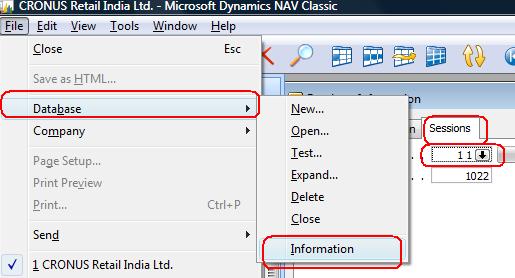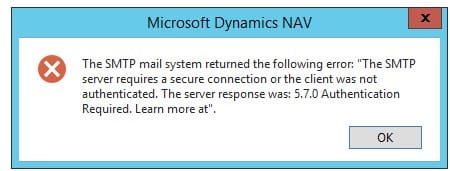Table of Contents
Business Central 2020 Wave 1 Features
Microsoft Dynamics 365 Business Central latest version 2020 wave 1 having following important features.
Business Central Complete Version List and Direct Download
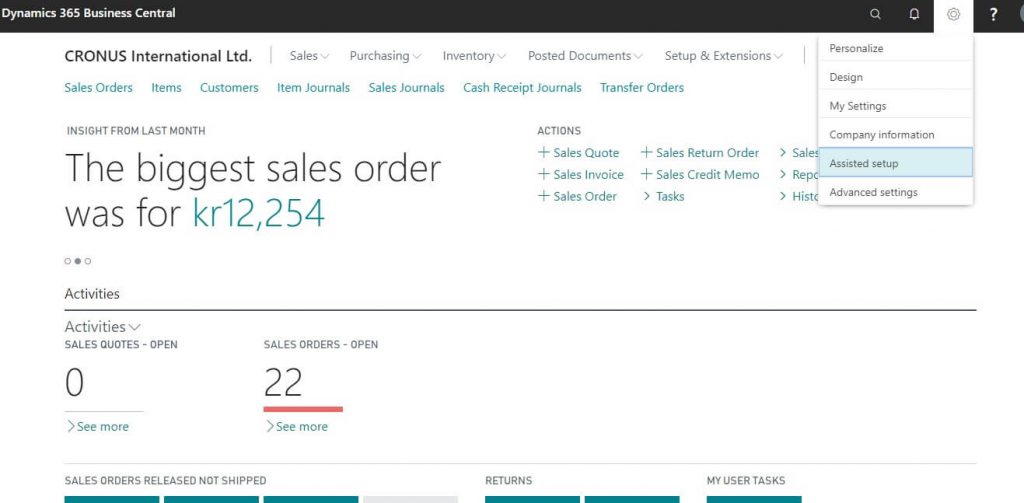
1. Application Enhancements
Auto-insert recurring sales and purchase lines
This features allows users to create recurring Sales and Purchase Lines based on Customer or Vendor based setup.
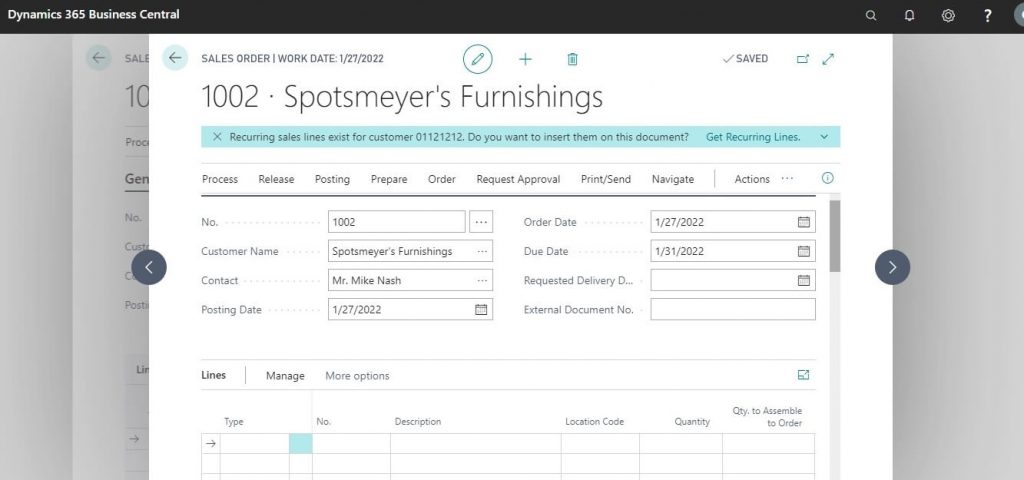
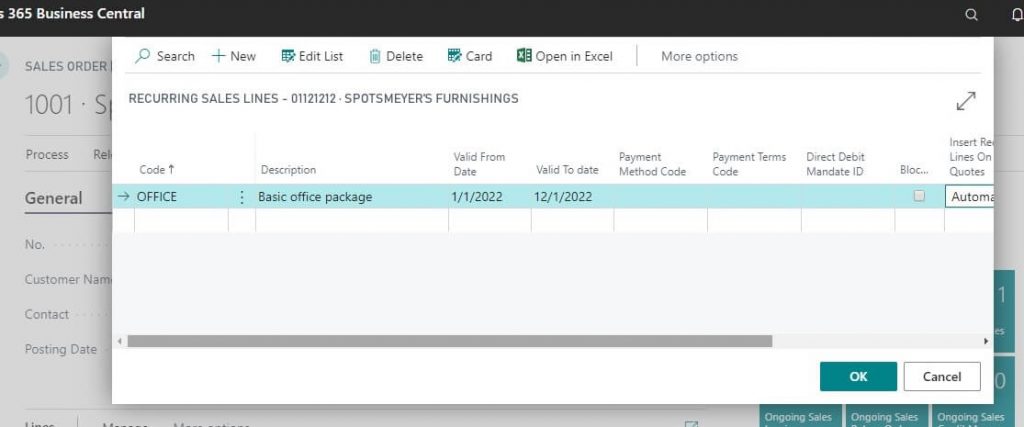
Feature details
Recurring Sales / Purchase Lines feature is extended to automatically insert on documents the recurring sales or purchase lines that are set up for the customer or vendor.
If multiple recurring sales or purchase lines exist for the customer or vendor, you will get a notification from where you can pick which one to insert. If only one recurring sales or purchase line exists, it will be inserted automatically.
works if the new document was created from a document list.
For example, by choosing the New action on the Purchase Orders page. It does not work if the document was created from a vendor card, for example.
Manage direct-debit collections in Service Management
More and more, business is related to services. Customers want a convenient way of paying for such work, especially recurring service work. The best way to do this is by using the Direct Debit Collection functionality in integration with the Service Management modules.
Feature details
You can now view direct-debit collection information on service orders, invoices, and contracts.
When posting service invoices, direct-debit information is stored in the related customer ledger entries and then transferred to the relevant payment journal during the collection process.
Notify requester about all changes for an approval request
You can set up an approval workflow to notify the approval requester about every change of an approval request up until final approval.
Print to attachment
When documents follow multiple steps in a process, such as a sales process or an approval workflow, it is useful to have a printout from the previous step added to the next step as a document attachment. Business Central allows you to print documents to document attachments using the Attach as PDF action.
Feature details
You can now add document printouts to the Attachments FactBox using the Attach as PDF action.
Receive more items than ordered
When you receive more goods than you ordered and it’s cheaper not to return such goods or your vendor offers you a discount, order processors and warehouse workers must be able to handle such receipts without going through a lengthy process of preparing and getting approval for a new purchase order.
Feature details
You can now receive a quantity higher than the ordered quantity on purchase orders according to an over-receive policy that you set up on the Over-Receipt Codes page. Here you can fill in the Over-Receipt Tolerance % field and select a policy to be used by default.
If your company uses purchase order approval, over-receiving can trigger a reapproval. You define this on the Over-Receipt Codes page. The Approve Over-Receipt workflow response is available in the workflow engine for this purpose.
On the cards for items and vendors, you can select in the Over-Receipt Code field which policy to use by default on purchases.
When you have selected an over-receipt code, you can enter a higher-than-ordered quantity in the Quantity to Receive field on released purchase orders and warehouse receipts.
Register capacity in units of seconds
Some manufacturing operations require work center capacity to be measured in units of less than a minute.
Feature details
You can now define the capacity on work centers in units of seconds. By extending the Capacity Unit of Measure Type field, a developer can even enable milliseconds or another unit of measure.
Revert Qty. to Invoice when cancelling order
Partial shipping/receiving and invoicing of orders are common practices in today’s business. As mistakes happen in these core processes, it is important to have robust and easy ways to follow the correction process, thereby keeping employees productive.
Feature details
You can now easily correct invoiced quantities on originating orders by cancelling invoices created from them. The Qty. to Invoice field on the originating order is automatically updated.
Use resources in purchase documents
Most businesses tend to outsource or hire external, named resources on a temporary basis, such as for a particular project or job. The ability to purchase resources allows you to track and process such transactions.
Feature details
You can now use Resource as a line type of purchase documents. For example, you can add resources on purchase orders, invoices, and credit memos and post purchase transactions for them. You can correct purchase documents with resource lines, copy them, or use resource extended text.
2. Modern client
Disable export of data to Excel
With the Edit in Excel and Open in Excel actions, users can quickly get an Excel spreadsheet with Business Central data for further processing in Excel. However, some organizations have data control rules with restrictions on having data sets in Excel, where it is more difficult to control and audit. Administrators can now specify which users are allowed to export data to Excel, which gives the organization stricter control over data.
Feature details
Business Central administrators have the option to disable features that allow users to export data to Excel. The ability to export data from Business Central is controlled by a new D365 EXCEL EXPORT permission set. If the permission is removed for a specific user, then the Edit in Excel and Open in Excel actions are no longer available to the user on any pages in the application.
Enable non-interactive printing in the cloud
Printing directly to a printer is now possible from the modern desktop clients. The setup that you make on the Printer Management page allows you to control which device to print to, including to cloud printers as defined by extensions. Using the Business Central modern clients, users who work in the browser can set up a printer selection for each report so that documents, labels, and other content are printed automatically on the selected printer. Administrators can manage a list of printers (including cloud printers), for example, by creating a friendly name for each and setting defaults. Additionally, for on-premises installations, any network printer that the server has access to will be available on the Printer Management page.
In addition, a predefined Email Printer extension is installed and ready for customers to use. This supports major printer manufacturers that enable email printing scenarios.
Enhanced mobile accessibility related to device orientation
Feature details
This enhancement makes access to information in FactBoxes reachable regardless of the device orientation by displaying a small chevron (either on the side or at the top of the page), allowing the user to “pull” the related information onto the screen. In previous releases, this action was only available with certain screen orientations. Now, it is available everywhere on any device. In the common scenario where a mobile phone is mounted on a holder in a vehicle (not driving), it is now possible for the operator to quickly access related information about a customer while the phone is in the holder.
Another change related to this enhancement is the redesigned Role Center view in Landscape mode on tablets. The navigation controls have been moved to the left pane, allowing users to quickly jump to a different page and get started with tasks. In previous releases, this was hidden under a menu. The change also allows users and administrators to personalize a Role Center with richer navigation by adding more elements to the Home group (for example, by bookmarking them). As a result, the cues have been moved to the right pane, allowing users to scroll the entire Role Center content.
Enter data more easily
Various adjustments that enhance typing or navigating fields in a list.
- In editable lists, users will be able to use the left and right arrow keys to navigate to the previous or next cell in a row. This provides a consistent experience between editable and non-editable lists, and increases the speed and agility of exploring data in a list or worksheet.
- Similar to Microsoft Excel, we’ve introduced the F2 key that toggles between selecting the entire value of a field and placing the cursor at the end of the value. This allows users to quickly replace the value or add to it. The F2 key is available for editable fields and editable cells in lists.
- When typing to fill in a row of data, the Tab key no longer sets focus to the ellipses that bring up the context for the row. This improves efficiency when rapidly entering data and ensures that Tab key presses are predictable. The context menu remains reachable using the left or right arrow keys.
Import profiles and UI customizations
Administrators and consultants benefit from a rich toolset that supports role-tailoring in Business Central. By having both an export and import function for profiles (organizational roles) and their corresponding user interface customizations, customers can easily back up their profile customizations before making further changes, replicate profiles across environments, or safely explore possibilities in an online sandbox before importing into production. All this without requiring the assistance of developers.
Feature details
Import a package of profiles or per-profile UI customizations using a simple wizard that guides you through the process.
Long-running operations can be canceled from the web client
Feature details
You can now cancel long-running operations or application jobs. The user sees a progress window that shows the number of processed rows with the option to cancel the operation. A typical scenario is the ability to cancel long-running batch jobs, but this feature extends to canceling other long-running operations, such as bulk posting of invoices.
Use a Find function on the Role Explorer
Your product functions might span several hundred options across different areas. Finding them in a visual format on the Role Explorer makes it easier for customers to navigate and go to the requested page or module. Also, finding reports is much easier now that users have a Find function in the Role Explorer.
Feature details
The Business Central Role Explorer has a new addition that complements manual navigation and expanding or collapsing menu groups. Users can now open the Role Explorer, with either the “hamburger” icon or the Shift-F12 keyboard shortcut, and then start typing what they are looking for. The Role Explorer does not filter the results but instead highlights the hits, as shown in the next image. Also, when a result is contained in a collapsed group, the Find function annotates that group using a teal-colored circle. Users can browse through the results using arrows or Ctrl+Up/Down keyboard keys.The Esc key closes the Find box and removes the value typed, so that new searching or browsing can be started. Note also that switching to the Explore all view retains the find value making it easy to navigate.
3. Service fundamentals
Ability to see current database locks
To locate a locking issue, it is sometimes important for an administrator to see the current database locks in the system.
Feature details
A new page called Database Locks is available in the client.
The page shows a snapshot of all database locks. Where possible, it displays details on the AL session that is causing the database lock.
Ability to see table sizes
When troubleshooting performance issues, sometimes it is necessary to see the distribution of data size across tables. This feature makes it easy for an administrator to look up this information.
A new page called Table Information shows the following:
- Company Name
- Table Name
- Table No.
- No. of Records
- Record Size
- Size (KB)
Information is shown for all companies for which the user has SUPER permissions.
Ability to view a list of sessions and cancel one or more of them
Sometimes, canceling a session is the only way to unblock a customer. For example, a long-running report is locking data in a table, preventing warehouse employees from working.
Prior to this feature, partners would need to contact support to locate and terminate the session.
Features
In the Business Central administration center, an administrator can see a list of active sessions on an environment and cancel one or more of them. All existing resources consumed by a session will also be canceled.
Resource limits for reports and web service calls
To make sure that other users can work even if a misconfigured web service method is running or a user started a report with no filters by mistake.
Feature
The Business Central server will have new settings where an administrator can set limits on the execution time for reports and SOAP web service calls. When the limit is reached, the server cancels the operation.
In Business Central online (software as a service), the default values are set by the Business Central operations team and cannot be overridden by customers or partners. In the 2020 release wave 1, the default values will be set to hours (actual values are to be determined).
For Business Central (on-premises), an administrator can control the settings in the server.



